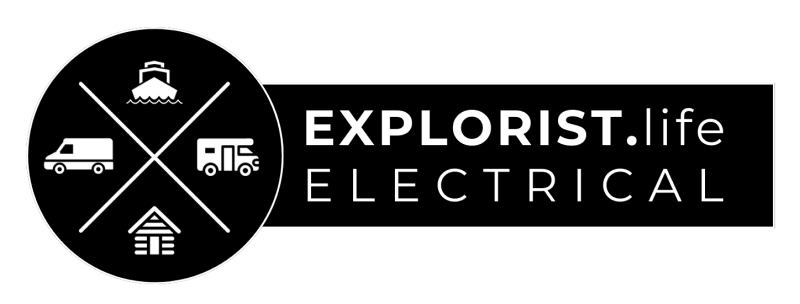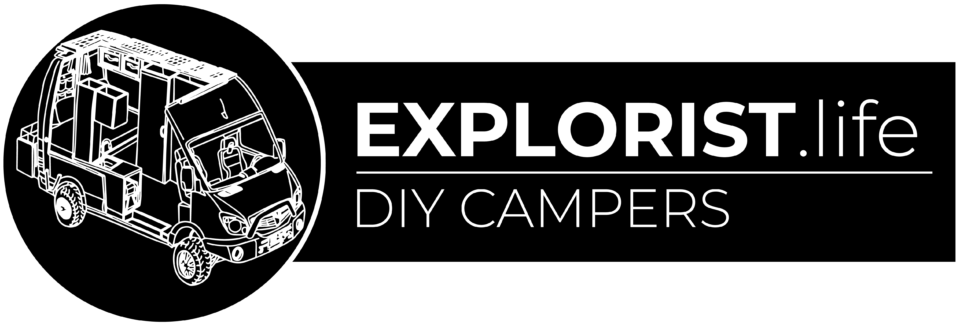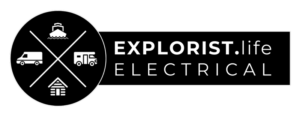
Fuses are a vital piece of safety equipment in any electrical system. Fuses protect the wire from an overcurrent event such as an electrical short or from trying to push too much power through too small of a wire. This blog post will teach you what type of fuse you need for your DIY camper electrical install.
Cheap vs Expensive Fuses
In the past, I’ve recommended very inexpensive fuses. They worked for a while and many people had good luck with them. Recently (since February 2020), both myself and the tech support team at Battle Born Batteries who I work closely with have seen an increasing number of quality control issues on these non-name-brand fuses that are so common on Amazon. These problems revolve largely around the fuse getting too hot under normal use. This would cause the fuse holder to melt, loosen, and cause the system to stop working.
So… if you wish to save some money and test your luck with these inexpensive fuses and fuse holders; that is your prerogative; but I can no longer recommend “no-name” fuses and fuse holders on EXPLORIST.life. So, the following list will include only fuses and holders from Blue Sea, Littelfuse, Bussman, Eaton, Spartan Power or similar that have, at least some kind of testing agency certification or code compliancy recognition (UL, ABYC, ROhS, etc).
How Big of a Fuse do I Need for [My Device]
This blog post is more about the various TYPES of fuses and not necessarily how to choose the sizes. If you want a more in-depth blog post & video that will teach you how to size a fuse, you can click here for the specific blog post on that topic: https://www.explorist.life/what-size-fuses-to-use-for-a-diy-camper-electrical-setup/



22 Responses
Hi
If I would like to use 2 batteries 75Amp each, what is the recommended fuse AMP? how to calculate the correct FUSE for such application?
The battery bank capacity doesn’t have much bearing on fuse size. Here is a tutorial for determining fuse size: https://www.youtube.com/watch?v=5y-yDMEgV70&t=1s
victron-lynx-distributor will this replace the bus bar that you made
Yes. Exactly.
Hi Nate. I know there are a lot of options, so it would be tiring to cover them all, but is there some reason you didn’t include Midi fuses as an option? The ANL fuses are space hogs, but doable if there is a good reason to prefer them. The Midi fuse holders from Bussman can be put together nice and tight, so they look like a good option to consider. Blue Seas Systems also has a Midi fuse block that combines Midi and spade fuses in one box.
I don’t have a system/diagram at https://www.explorist.life/solarwiringdiagrams that used MIDI fuses; so they didn’t make the list here. Those are good too, though, if you have a use for them in your system design.
Hi Nate! Thank you for all of the information; I’m enjoying exploring the site. I intend to use a strictly DC system initially: Ceiling fan, puck lights, cell phone charging, maybe a small fan. It there a blade fuse holder box you recommend? I think the WFCO distribution panel is far more than I need, but I don’t want to skimp on anything electrical!
Yep! For DC only, I’d recommend this: https://amzn.to/3k1dnyI
Hi Nate, One of the solar installers on a FB group I belong to is recommending a 400A Class T fuse instead of a 400A ANL fuse at the battery bank. I have already purchased the ANL fuse and holder but am willing to buy a Class T fuse and holder if you think I should. I trust your judgement more that any of the installers in the FB group and would appreciate your input.
Both ANL and Class T Fuses have Ampere Interrupting capacity high enough to be used as the main fuse at the battery bank as per ABYC E-11 Table IV: http://www.blackfinforums.com/sites/default/files/10/attachments/abyc-e-11.pdf
I recommend ANL fuses as the main fuse in ALL of my diagrams & parts lists found at https://www.explorist.life/solarwiringdiagrams as they satisfy the aforementioned requirement and the are a little less expensive than Class T fuses. (Note: High Quality ANL Fuses & Fuse Holders like Blue Sea, LittelFuse, or Bussman are HIGHLY recommended and are listed on each of the diagrams from the previous link.)
Hi Nate I love your YouTube videos it has already helped me a great deal! could you please tell me if I really need a combiner box for my backyard array (I know it’s not a camper but it should be the same right?) with 4 195w panels in series parallel or can I get away with fuses at the mc4 connector as well as the other needed places? thank you and please keep the videos coming
The main determining factor on that will be wire size. If you can use 10 AWG for all of the wire, MC4 combiners should be fine (verifying with your local building codes). If you need bigger wire to overcome voltage drop, you may need to use a combiner.
Use my wire size calculator to see what the recommended wire size is for your specific needs and distance from array to charge controller: https://www.explorist.life/wire-sizing-calculator/
Being a “newbie” to the diy community with a school bus as my small family and I’s new home the electrical is probably the most challenging aspect of it all. Knowing what is need by appliances (voltage, amperage,etc.) and than laying out where each appliance is located will ultimately determine how my electrical will be wired. I’ll continue to explore your site and see what pops out. Just unsure about how electrical works, wiring, fuses, etc.
Thank you for posting what you have as it’s been informative so far Nate. As I already stated I’ll keep perusing your site, any advice you can extend is greatly appreciated. The main thing is to not make my home on wheels an electrical time bomb through ignorance.
Great! Glad you’ve found it helpful.
The wiring diagrams I can see on my Chromebook and Lenovo all-in-one are not interactive. How can I access those?
My newest diagrams are no longer interactive. The interactive functionality didn’t work very well so I have phased it out. Watch the video on any of the diagrams found at https://www.explorist.life/solarwiringdiagrams to see how to use the most recent wiring diagram pages.
Love your content and easy instructions.. question. If I’m running a DC appliance to my WFCO WF-8930 distribution panel, do I need to bring the negative wire from my DC appliance back to my distribution panel, can I just ground the negative wire to metal (sheet metal) somewhere close to save on copper wire? assuming the Lithium batts are already chassis grounded and assuming I sand off any paint so that I have a good ground?
Ideally, yes. You should bring the negative wire back to the fuse block. This is the proper way to do it.
This is why I try to stay away from anything Chinese, not just fuses but inverters, charge controllers and batteries!
Obviously you can do whatever you like, but avoiding products for a specific country of manufacturer is not a good metric for determining if a product is good or poor quality. For example, which of the following would be a more quality item?
A product that is designed in the USA; carries a UL listing, but manufactured in China.
or…
A product that does not carry any kind of UL listing or certifications but is made in Indonesia.
The product with the UL listing that is manufactured in China will likely be a higher quality product.
But if the only metric of finding high quality products was ‘avoiding chinese products’ would say that the non-UL listed product would be higher quality simply because it was not made in China.
What would you charge me to design my wiring system? If I provide the requirements and components.
I am currently not offering custom wiring diagrams. Sorry about that! But, from the wiring diagram request form you filled out, this diagram should get you 80% of the way to what you are trying to accomplish it seems: https://www.explorist.life/30a-camper-inverter-with-solar-and-alternator-charging-wiring-diagram/